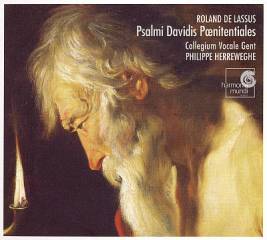Orlando di Lasso – Psalmi Davidis Poenitentiales (Herreweghe) [2006]
Orlando di Lasso – Psalmi Davidis Poenitentiales (Herreweghe) [2006]

Disc 1 1 Domine, ne in furore two arguas me 16:26 2 Beati, quorum remissae sunt iniquitates 18:22 3 Domine, ne in furore two arguas me 27:11 Disc2 1 Miserere mei, Deus, secundum magnam misericordiam tuam 24:24 2 Domine, exaudi orationem meam 27:14 3 De profundis clamavi ad te Domine 9:17 4 Domine, exaudi orationem meam 17:46 Collegium Vocale Gent Philippe Herreweghe - conductor
It's a mystery why Lassus' Penitential Psalms have not received more attention on disc--but then, after hearing these sublime performances it's easier to accept this state of affairs. Simply put, Philippe Herreweghe and his Collegium Vocale Gent offer the most sonorous, vocally vibrant versions of these works, with taut ensemble and a natural, unforced symmetry among melody, rhythm, tempo, and text. Of course, this is exactly what these works--some of the finest examples of Renaissance polyphony and artful integration of styles--require for successful performance.
From very early in the first of the seven psalms we can appreciate not only the choir's absolute command of Lassus' varied technical and interpretive elements but also the substantial aural delights of his rich textures and unencumbered, ever-flowing polyphony. If you're a seasoned listener to Renaissance choral music, when you hear these performances you can't help but move aside--even if temporarily--all other of your favorite composers in deference to such transcendent mastery of structure (making a cohesive larger work out of lengthy texts) and rhetorical expression (employing principles of natural speech inflection), all the while sustaining momentum and tension within a many-hued, multi-textured musical fabric.
And did I mention beauty? The perfectly tuned and balanced voices of Collegium Vocale Gent, recorded in appropriately resonant yet clear, detailed sound, never let us forget that aside from its other impressive features, Lassus' music is conceived in beauty. It's important to note that this set does not include the "eighth" psalm, Laudate Dominum, (included on Hyperion's recently reissued recording with Henry's Eight) that Lassus attached to the other seven in order to complete a cycle honoring the then-popular theoretical system of eight modes. But its different subject--praise instead of penitence--makes a good argument for programming it in a different context. Also worthy of mention: the set's booklet essay by Ignace Bossuyt is a model of informative, interesting, pertinent note-writing. Bravo! --David Vernier, ClassicsToday.com
download (mp3 @320 kbs):
yandex 4shared mega mediafire zalivalka cloudmailru uplea








